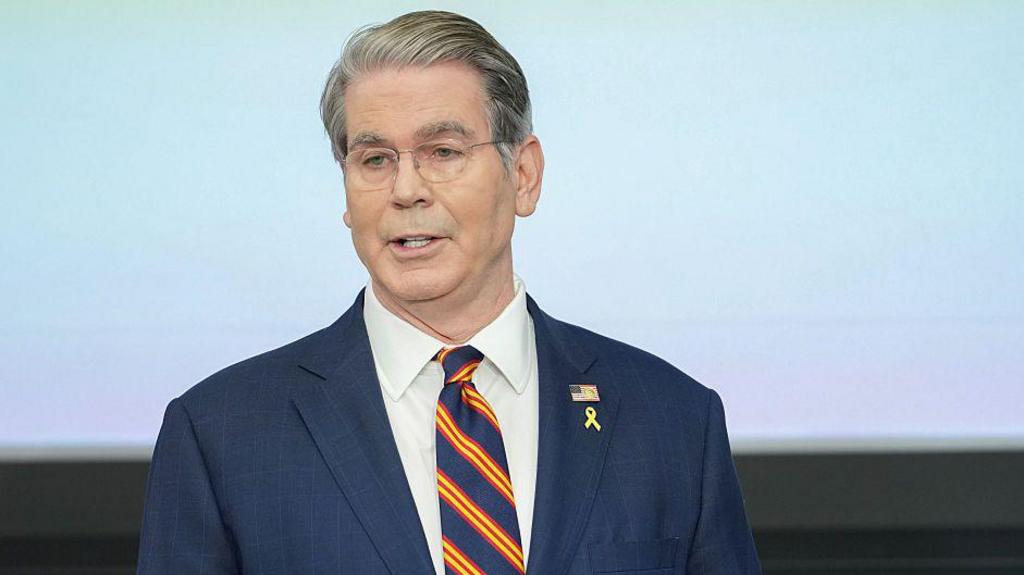The United States has initiated the purchase of Argentine pesos, marking a significant step in a contentious effort to stabilize the South American nation’s currency crisis and support President Javier Milei, a known ally of former President Trump.
Treasury Secretary Scott Bessent announced the currency acquisition via social media, concurrently confirming the finalization of a planned $20 billion financial aid package for Argentina.
“The US Treasury stands ready to implement any extraordinary measures deemed necessary, effective immediately,” Secretary Bessent stated.
The announcement triggered a positive response in financial markets, bolstering the peso and Argentine debt. However, it also reignited debate within the US, where the decision to extend financial assistance to Argentina amid domestic spending cuts has faced increased scrutiny.
Senator Elizabeth Warren (D-MA) voiced her opposition on social media, stating, “Instead of utilizing American taxpayer dollars to purchase Argentine pesos, the priority should be ensuring affordable healthcare for Americans,” referencing a central point of contention in the ongoing US government shutdown.
Argentina has been grappling with escalating financial instability in the lead-up to the midterm elections scheduled for October 26. Concerns are mounting regarding the electorate’s continued support for President Milei’s austerity-driven, free-market reform agenda following recent setbacks in a provincial election.
The peso’s value has experienced a sharp decline in recent months, accompanied by investors divesting from Argentine stocks and bonds.
The Milei administration has implemented measures to stabilize the economic climate; however, these actions have depleted the nation’s reserves, occurring months before significant debt payments are due.
Secretary Bessent, known for his involvement as a currency trader in the “Black Wednesday” event of 1992, which led to the devaluation of the British pound, asserted in a statement that the success of Argentina’s “reform agenda” is of “systemic importance.”
“A robust, stable Argentina that contributes to a prosperous Western Hemisphere is in the strategic interest of the United States,” he added. “Its success should be a bipartisan priority.”
The Treasury Department has yet to provide detailed information regarding the US support, including the quantity of pesos purchased or the specific terms of the $20 billion currency swap line, which will allow Argentina to exchange pesos for US dollars.
President Milei expressed his gratitude to former President Trump and Secretary Bessent for their support in a social media post.
“Together, as close allies, we will forge a hemisphere characterized by economic freedom and prosperity,” he affirmed.
Argentina has defaulted on its debt three times since 2001, most recently in 2020.
However, investors, including those with ties to Secretary Bessent, such as Robert Citrone, have shown renewed interest in the country in recent years, betting on President Milei’s libertarian financial reforms.
Since assuming office in 2023, President Milei has implemented deregulation and substantial cuts to public spending in order to curb inflation and achieve a fiscal surplus.
Domestically, these austerity measures have faced increasing opposition as the population’s purchasing power declines and the country faces a likely economic recession.
Nonetheless, these measures have contributed to curbing inflation and have been largely welcomed by international investors and the International Monetary Fund (IMF), a key lender to Argentina.
President Milei, who styles himself as a Trump-like figure with “Make Argentina Great Again” rhetoric, has also garnered admiration from many conservatives in the US. He has met repeatedly with former President Trump, with another visit anticipated next week.
However, the decision to extend financial support to Argentina has elicited backlash among American farmers, a key part of former President Trump’s voter base, who are concerned about China’s shift in soybean purchases to countries including Argentina.
Senator Chuck Grassley (R-IA), representing Iowa, a major soybean producer, questioned on social media last month, “Why would the USA help bail out Argentina while they take American soybean producers’ biggest market???” when the US first pledged its support.
Secretary Bessent’s announcement followed four days of meetings with Argentina’s Economy Minister Luis Caputo.
In his announcement, Secretary Bessent stated that the international community is “unified behind Argentina and its prudent fiscal strategy, but only the United States can act swiftly. And act we will.”
He has previously rejected suggestions that the support constitutes a bailout for what Senator Warren, in a statement on Thursday, characterized as the administration’s “billionaire buddies.”
“This trope that we’re helping out wealthy Americans with interests down there couldn’t be more false,” Secretary Bessent stated to CNBC earlier this month.
“What we’re doing is maintaining US strategic interest in the Western hemisphere,” he said, warning that inaction risked a “failed state.”
James, who led a civil fraud case against US President Donald Trump, was indicted in Alexandria, Virginia.
The US government shutdown began after Republicans and Democrats failed to resolve a budget dispute.
With the shutdown about to enter its second week, Trump says some furloughed workers “don’t deserve to be taken care of”.
Nerves were raw in a hearing that covered much ground, and saw Trump’s attorney general go on the attack.
This was the fifth time that Republicans and Democrats brought their funding measures up for a vote.

